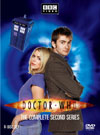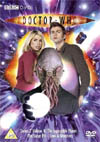DVD Extras (box sets only) include:
The next problem seems to have been dragged out of its retirement in the 1960's and is called "missing Doctor syndrome" for its attempt to do episodes that don't have the Doctor in them. Unlike modern Star Trek or other ensemble shows, the central character in Doctor Who is too strong to allow episodes without him to be anywhere near as good as the episodes with him. That said, the one critical thing that must happen to make Doctor-less episodes work in some fashion, is for the companions and remaining characters to be successful at getting to grips with the story themselves, instead of woefully and aimlessly mooning about, wishing the Doctor were there, and wandering around looking for him. Well, guess what folks? Your main character this time around is a friendly bloke named Elton, and he and his gang's only mission is to run around looking for the Doctor. Worse, they're easily distracted by all the things you won't care to watch them doing, and if they ever get down to doing some searching, it makes them feel miserable and manipulated.
Then, after Elton's bedroom dancing with the camera on makes you wonder why you're still watching, everything tanks as Elton and Ursula get involved with a group that easily represents Doctor Who fandom, albeit in a fictional world where the Doctor actually exists and doesn't broadcast regular adventures on television. This group proves itself to have less purpose, taste, talent, or self-worth than most actual decent fan groups, and so does not make good viewing. 'Nuff said about that.
Peter Kay coasts in on his comedian's reputation while the rest of the cast and crew revere him behind the scenes. As someone who's never heard of him before, I don't see what all the fuss is about. He's not much impressive in this rubbish story, which I suspect no amount of acting genius could truly salvage. The Victor Kennedy portions aren't too bad, but hold little interest for the viewer. And the narrative truly scrapes the bottom of its dismal barrel in the final act. As for comedy, there's too much morbidity in play canceling the humour right out. Poor taste indeed. And why is it that the production team has waited until the worst episode came along to give the TARDIS its first truly highlighted on-screen materialization in David Tennant's era? This exemplifies a frustration I've always felt when looking for a good story to use to initiate viewers to the Doctor Who universe: the best stories seem to ignore decent demonstration of the essentials of the TARDIS, while the stories that take care of the essentials of the TARDIS are typically lacking elsewhere in the adventure. At this point, I'm going to call attention to the supposed moral of the story that writer Russell T. Davies tacked on at the end. This sentiment is a favourite re-run of Russell's; we've seen it band-aided onto "Bad Wolf" (story no. 170) and half of his other stories in some form or other. The idea is good; we believe in it. We're just not sure why there's a whole episode that works hard to prove the opposite attached to the front of it. I'll only delve into the spoilers that prove my point in the In-depth Analysis version of this review, but suffice it for now to ask: Exactly what is this enigmatic wonderful madness that's supposedly so much better than the average life? Monsters that come in and threaten to wreck it? When the moral of a story fits the story as badly as this, it makes you wonder what the writer's real purpose was. Two completely unworthy possibilities have likely been combined: Number one, a contest was held for 8-10 year olds to come up with a monster that Russell promised he'd write into an episode. "Monsters" (and fear for that matter) just aren't what good science fiction is about. They can only be, at best, supporting by-products. If you're not exploring something worthwhile in your sci-fi, it's liable to be just a pile of rubber prosthetic rubbish. Designing a story around any old monster that happens to win a contest is not a brilliant idea at all. Russell's second purpose has more to do with David Tennant and Billie Piper not really featuring in the story. The whole thing was designed to be shot by a second unit, while the main unit shot "The Impossible Planet" (story no. 178) at the same time. In other words, this is in large part an exercise in budget balancing and compensating for cramming too many things into the shooting schedule. Can't do 14 decent episodes per year? How about canceling the annual Christmas Specials, which don't really suit the time-traveling, galactic-wandering nature that is supposed to be at the heart of the show, and focus on making 13 episodes that better suit the scope and quality of the show. This is a case where less would be more.
This story has become available on DVD. Click on the Amazon symbol for the location nearest you for pricing and availability:
Note: The full season sets contain commentaries, behind-the-scenes featurettes, and other extras. The smaller volumes only feature the plain episodes. Comments on this article are welcome. You may contact the author from this page:
|









